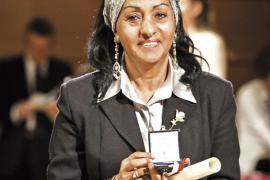
Alganesh Fessaha
We publish the Introduction journalist Luciano Scalettari, Africa correspondent of magazine Famiglia cristiana, wrote of Alganesh Fessaha's book, Occhi nel deserto (Eyes in the Desert), about the rescue of migrants in the Sinai.
There are people who cannot tolerate injustice. They really cannot accept it. In the face of abuse, in the face of the vulnerable people who are submitted to it, they must react. They take up the challenge, they feel the need to fight injustice. In over 25 years of career as a journalist, I sometimes came across such people: they immediately act to relieve the pain caused by injustice, and to stop abuse.
Alganesh Fessaha is one of these people. It seems as if she could not do without fighting abuse. I travelled, discussed, talked with her dozens times. She never expresses anger, rebellion or aggression against one or another injustice. Never. Nonetheless she is always extremely determined. Quiet but determined. Maybe this belongs to the DNA of her people: tenacious up to stubborness, unbending, determined to achieve the goals.
This was probably the education that shaped Alga – as we all call her – and prompt her to decide, as she was still very young, that the injustice to which the Eritreans were submitted, the lack of freedom of her people, was unacceptable. And she fought against this, putting herself in the line unconditionally.
And this proved true also afterwards, when her people had seemingly set free: it had ousted the invader, but soon it found itself under another form of oppression, exerted by a liberticidal and authoritarian government. She took up the challenge again, albeit in a different way, i.e. by helping those desperates – young boys and girls, young adults – compelled to flee their land, and ending up as prey to the traffickers of human beings, and exploitations of many kinds – political and not – from those who saw in these “travels of hope” a business from which to take advantage in all possible ways.
This is how her phone started being on night and day, and her number passed from hand to hand “because if you find yourself in an emergency situation, call that number, Alga will answer from MIlan...”
And if the phone rings, Alganesh does not shy away: she does something, she helps someone, often she leaves and goes to the rescue of some unfortunate person who called for help.
One evening I met her for dinner, as we periodically do. Alga showed up with a black eye and a considerable bandaging around her shoulder: “Ehi, what do you want to do about it?” she told me in a tranquil mood, “ Libyan police do not go easy on people”.
It was the time of the Libyan “spring” and the ousting of Khadafi. The phone kept ringing on and on in those weeks, because there was the “hunt for Africans” all over the country. Alga had decided to go there. She had gone to the search for the groups of refugees that were again forced to hide and escape. She had found many, but she had also found a gang of policemen who had carried out a real beating, from which neither her Italian passport nor the fact of being one of the co-founders of the Gandhi NGO had not protected her.
The tale told in these page, though, belongs to a different endeavour by Alga: her struggle to stop the trafficking of human beings in Sinai and free its victims. She saved many, many others not, as unfortunately we know from the sad body count. We now know the death toll of this horrendous trafficking.
It is one of those silent “genocide” cases that have sullied – and still sully – our collective conscience. The stories behind the pictures and the tales of this book are among the most difficult we could ever listen to. They are stories of extreme, inhumane, unspeakable violence. What happened to the migrants in Sinai over the past few years must be added to the great modern tragedies, like the Holocaust of the Jews, the Rwandan genocide, the terror regime of Pol Pot in Cambodia, the giant exterminations in the war in Congo. But among these tragedies, this overcomes all others in one feature: it went totally ignored.
Alganesh Fessaha has been one of the very few people to understand the crime that was being perpetrated and how hateful it was, since it hit refugees who were already desperate and extremely vulnerable. Was it the merit of that always ringing phone? It can be. Surely, Alga, as usual, could not remain silent and watch. Once again she left. Once, twice, five times, thirty times she caught a plane. She went to Sinai, she found support and reference points to step in and free the victims of trafficking, to take them into safety. And she never quit reporting, trying to find somebody who would heed her.
Today the international community starts being aware. Not enough, but at least people talk about this. We start learning about the horrible things that happened in Sinai: abductions, torture, extortions, organ trafficking, the dead who were abandoned in the desert or ended up unnamed in an Egyptian cemetery.
If the Sinai events are examples of the “globalization of indifference” mentioned by Pope Francis, Alga is instead the example that there can be a “globalization of brotherhood”, that proves stronger than the one of indifference. She teaches us that we should never accept injustice. We must denounce it and defeat it.
And above all for this I am grateful to her.

